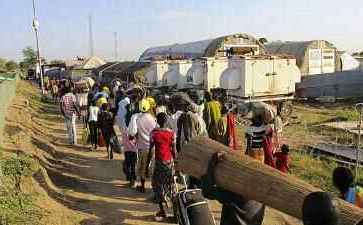AU condemns latest ethnic violence in South Sudan
April 22, 2014 (ADDIS ABABA) – The African Union (AU) has condemned the latest round of violence in South Sudan’s Unity and Jonglei states in which hundreds of civilians were killed in apparent ethnically motivated attacks.

This was followed by an attack two days later on civilians sheltering inside a UN base camp in Jonglei state capital Bor, which left more than 40 dead and scores wounded.
The attacks have shattered a January ceasefire deal signed between the South Sudanese government and the rebel Sudan People’s Liberation Movement/Army in Opposition, brokered by the Intergovernmental Authority on Development (IGAD), which is mediating peace talks.
Dlamini-Zuma has called on both sides to investigate the attacks and bring those responsible for the killings to justice.
“The chairperson of the commission strongly urges both parties to the conflict in South Sudan to take seriously the upcoming political negotiations to resolve their dispute,” the AU said in a statement issued on Tuesday, with Dlamini-Zuma also calling for a deployment of an IGAD-led monitoring team to implement the terms of the ceasefire agreement and “avoid such similar tragedies in the future”.
AU FIELD MISSION
comments come as the AU Commission of Inquiry on South Sudan began its first field mission on Monday.
The mission comes as part of AU efforts to end the conflict that broke out in South Sudan in mid-December last year after political tensions between South Sudanese president and former vice-president Riek Machar erupted in violence.
The commission plans to meet with Kiir and other senior government officials, as well as Machar and representatives of the opposition group.
The field mission continues until 1 May, with the commission is tasked with investigating human rights violations and other abuses committed during the armed conflict, with the aim of achieving sustainable peace and security in the country.
The AU delegation is also due to meet with the chairman of the South Sudan Human Rights Commission, as well as civil society representatives and Church leaders, among others.
The commission is expected to release its report within the next three months.
INTERNATIONAL CONDEMNATION
Meanwhile, the foreign office minister for Africa, Mark Simmonds, has also condemned “in the strongest possible terms” the killings in Bentiu and Bor.
“The deliberate killing of civilians and IDPs (internally displaced persons) is a clear violation of international law and these crimes will be investigated and those responsible held to account,” he said in a statement.
“All Inflammatory media statements by those in positions of influence in South Sudan must also cease. Not only those individuals perpetrating these atrocities, but those inciting them, will also be held accountable,” he added.
The fighting in South Sudan has taken on disturbing ethnic dimensions, with loyalties dividing along Kiir’s Dinka tribe and Machar’s Nuer ethnic group, although both politicians have supporters across tribal lines.
Bentiu and Bor have changed hands several times since conflict erupted as pro-government and rebel forces battle for control of strategic areas across the country. Both sides are accused of committing atrocities.
Investigators from the UN Mission in South Sudan (UNMISS) said they had confirmed that rebel forces in Bentiu had conducted searches and carried out targeted killings of civilians after determining their ethnicity or nationality.
In a separate attack on 17 April, heavily armed gunmen reportedly stormed the UN compound in Bor and opened fire on nearly 5,000 IDPs, mostly of Nuer origin, who were sheltering at the site, with women and children among the casualties.
The attacks have generated international condemnation, including from the US government, with special envoy Samantha Power urging all parties to regard UNMISS sites as inviolable.
Thousands have died in the conflict, which has also displaced more than one million people.
Aid agencies have issued dire warnings for the country, which they say is facing a humanitarian catastrophe.
(ST)
